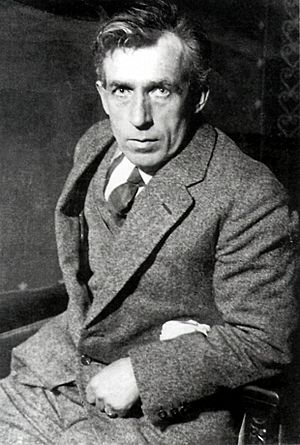Peadar O'Donnell facts for kids
Quick facts for kids
Peadar O'Donnell
|
|
|---|---|

O'Donnell, c. 1930
|
|
| Teachta Dála | |
| In office August 1923 – June 1927 |
|
| Constituency | Donegal |
| Personal details | |
| Born | 22 February 1893 Dungloe, County Donegal, Ireland |
| Died | 13 May 1986 (aged 93) Dublin, Ireland |
| Spouse |
Lile O'Donel
(m. 1924; died 1969) |
| Military service | |
| Allegiance | Irish Republic |
| Branch/service |
|
| Commands | Commander of the 2nd Northern Division |
| Battles/wars |
|
Peadar O'Donnell (born February 22, 1893, died May 13, 1986) was an important Irish figure in the 20th century. He was known as an Irish republican, a socialist activist, a politician, and a writer. He was one of the most radical thinkers in Ireland during his time.
Contents
Early Life and Education
Peadar O'Donnell was born in 1893 in Meenmore, a place near Dungloe in County Donegal. His family spoke Irish. His father, James, worked in a kiln and was also a musician. Peadar's uncle, Peter, was a member of a workers' rights group in America called the Industrial Workers of the World.
Peadar went to St Patrick's College in Dublin to become a teacher. He taught on Arranmore Island, off the coast of Donegal. There, he learned about socialism. In 1918, he helped organize workers for the Irish Transport and General Workers' Union (ITGWU).
Irish War of Independence
By 1919, Peadar O'Donnell was a key organizer for the ITGWU. He tried to start a socialist militia group in Derry. When that didn't work, he joined the Irish Republican Army (IRA). He stayed active with the IRA during the Irish War of Independence (1919–1921).
He led IRA guerrilla actions in County Londonderry and Donegal. These actions mostly involved raiding police stations and British Army bases. In 1921, he became a commander in the IRA. Peadar was known for being headstrong and sometimes didn't follow orders from his superiors. He often started operations without permission.
O'Donnell also tried to stop decisions made by the Dáil Courts. He felt these courts sometimes favored large landowners. He prevented the Irish Republican Police in his area from enforcing these rulings, especially those about land. In 1921, he and his men managed to avoid a large British force of over 1,000 soldiers in County Londonderry.
Irish Civil War
After the Anglo-Irish Treaty in 1922, the IRA split. Some members accepted the Treaty, which created the Irish Free State. Others, like O'Donnell, opposed it because it didn't create a fully independent Irish Republic.
In March 1922, O'Donnell was chosen to represent Ulster on the anti-Treaty IRA's Army Executive. In April, he was among the anti-Treaty IRA members who took over the Four Courts building in Dublin. This event started the Irish Civil War.
O'Donnell escaped from the Four Courts after it was attacked. However, the Free State Army later captured him. He was held in Mountjoy Gaol and the Curragh. After the Civil War ended, he joined a large hunger strike in 1923. This strike protested the continued imprisonment of anti-Treaty IRA members. O'Donnell was on hunger strike for 41 days.
His experiences in prison and his escape in March 1924 are described in his 1932 book, The Gates Flew Open. In March 1924, O'Donnell walked out of the Curragh camp wearing a Free State uniform. He hid for several days before finding a cottage. He told the owner, "I'm Peadar O'Donnell, IRA Executive. I want to get in touch with the organization here." The owner helped him.
Socialist Ideas and Actions
Peadar O'Donnell believed that Ireland's fight for freedom should also be a fight for social change. He saw himself as a follower of James Connolly, a socialist republican who was executed after the Easter Rising. O'Donnell wanted an independent Ireland to have a social revolution.
Between 1919 and 1923, there was a lot of social unrest in Ireland. Tenants occupied land, and workers took over factories. O'Donnell is believed to be the first Irish person to use the word "occupation" for taking over a workplace. This happened in 1919 when he and the staff of Monaghan Asylum occupied the hospital. They even raised the Red Flag over the building. This was one of the first "Soviets" declared outside of Russia. O'Donnell became the "governor" of this Soviet. He set a 48-hour work week for the staff and fired the matron for not following orders.
O'Donnell thought the IRA should have supported the common people. He believed they should have pushed for land redistribution and workers' rights. He felt that the anti-Treaty republicans lost public support in the Civil War because they didn't have a strong social plan.
He was against the strong Catholic nationalism of many IRA members. He once said that in Belfast, they didn't have an IRA battalion, but "a battalion of armed Catholics." Eventually, he left the IRA to help start the communist Republican Congress.
Post-Civil War Politics
In 1923, while still in prison, O'Donnell was elected as a Sinn Féin Teachta Dála (TD) for Donegal. A TD is a member of the Irish parliament. After his release in 1924, he became part of the anti-Treaty IRA's leadership. He also became the editor of the republican newspaper An Phoblacht. He did not take his seat in the Dáil and did not run for election in June 1927.
He tried to move the republican movement towards left-wing ideas. He started groups like the Irish Working Farmers' Committee. This group sent representatives to the Soviet Union. O'Donnell also founded the Anti-Tribute League. This group opposed paying land annuities to the British government. These payments were a huge cost to the new Irish state.
In 1932, the Fianna Fáil party came to power in the Irish Free State. They lifted the ban on the IRA. This led to more conflict between republicans and their former enemies. In response, a group called the Army Comrades Association, nicknamed "the Blueshirts", was formed. They were made up of former Free State army members. After much street violence, both the Blueshirts and the IRA were banned again.
Republican Congress
Peadar O'Donnell wanted the anti-Treaty IRA to become a socialist organization. When this didn't happen, he and other left-wing republicans left the IRA. In 1934, they helped create the Republican Congress. This group included socialists, communists, and members of Cumann na mBan.
The main goal of the Republican Congress was to unite against fascism. Even though O'Donnell had left the IRA, an IRA court-martial tried him and others without them being present. They were dismissed from the IRA.
The Republican Congress was very successful between May and September 1934. It brought together many groups fighting for workers' rights. The IRA leadership banned its members from joining the Congress. However, many IRA members in Dublin joined the Congress anyway. The Republican Congress also had great success in organizing Protestants in Belfast.
In June 1934, members from the Shankill Road branch of the Congress marched to Bodenstown. They carried banners with slogans like 'Break the Connection with Capitalism'. The IRA leadership tried to stop them from carrying their banners.
The Republican Congress led attacks on the Blueshirts in Dublin. By September 1934, the Blueshirts were losing power. The Republican Congress held its final meeting in Rathmines. The group split over whether to become a political party. O'Donnell believed they were stronger as a united front.
Spanish Civil War and Later Life
In 1936, O'Donnell was in Barcelona, Spain, for a sports event when the Spanish Civil War began. He joined the Spanish Republican militia, which supported the government against Francisco Franco's military uprising. When he returned to Ireland, he encouraged other republicans to fight for the Spanish Republic.
Members of the Republican Congress, led by Frank Ryan, joined the International Brigades. They were known as the Connolly Column. This was not a popular choice in Ireland. The powerful Catholic Church supported Franco's Catholic Nationalists. O'Donnell pointed out that the bishops had condemned the anti-Treaty side in Ireland's Civil War for opposing a democratic government. Now, they were supporting the same thing in Spain.
After the 1940s, O'Donnell spent more time writing and less time in politics. He published his first novel, Storm, in 1925. His book Islanders (1928) was highly praised. The New York Times called it a novel of "quiet brilliance and power." Another book, Adrigoole (1929), was a sad story based on a real family who died of starvation.
Other books by O'Donnell include The Knife (1930), On the Edge of the Stream (1934), The Big Windows (1955), and Proud Island (1975). He also wrote about his experiences in Spain in Salud! An Irishman in Spain (1937). All his writings showed a strong interest in social issues.
From 1946 to 1954, O'Donnell edited a literary magazine called The Bell. He had helped start it in 1940. In 1948, George Orwell listed O'Donnell as someone unsuitable for anti-communist propaganda work.
His only play, Wrack, was first performed in Dublin in 1932. O'Donnell wrote seven novels, one play, and three autobiographical books. These include The Gates Flew Open (1932) about the Irish Civil War, Salud! An Irishman in Spain (1937), and There Will Be Another Day (1963).
In 1939, Peadar and his wife Lile traveled to the United States. There, he met the singer Paul Robeson. O'Donnell is said to have taught Robeson the song "Kevin Barry", which became one of Robeson's most famous songs.
Personal Life
Peadar O'Donnell married Lile O'Donel on June 25, 1924, after he escaped from Kilmainham jail. They had never met before, but they had exchanged many messages while he was in prison. Lile helped him communicate with people outside. Lile had a large inheritance, which allowed Peadar to focus on his writing and political work.
They lived in Dublin for many years. When Peadar's brother Joe died in New York, Peadar and Lile brought Joe's young son, Peadar Joe, to live with them. They raised him as their own son, as they had no children.
Lile died in 1969. Peadar then moved to a small apartment in Dublin. He also lived with his nephew Peadar Joe and his family. He spent his last seven years living with a friend, Nora Harkin.
In 1985, Peadar O'Donnell wrote his last piece, "Not Yet Emmet." He died in 1986 at the age of 93. He asked for "no priests, no politicians and no pomp" at his funeral, and his wishes were followed. His ashes were placed in his wife Lile's family plot in County Mayo.
The Irish folk-rock band Moving Hearts recorded a song called Tribute to Peadar O'Donnell in 1985.
Works
- Storm, novel, 1925
- Islanders, novel, 1928 (Also published as The Way it Was With Them in America)
- Adrigoole, novel, 1929
- The Knife, novel, 1930
- The Gates Flew Open, Irish Civil War prison diary, 1932
- Wrack, play, first performed 1932, published 1933
- On the Edge of a Stream, novel, 1934
- Salud! An Irishman in Spain, memoir, 1937
- The Big Window, 1955
- There Will Be Another Day, autobiographical, 1963
- Proud Island, 1975
- Not Yet Emmet, a history, 1985
See also
 In Spanish: Peadar O'Donnell para niños
In Spanish: Peadar O'Donnell para niños
- John Fahy
- Ernie O'Malley
- List of members of the Oireachtas imprisoned during the Irish revolutionary period
 | Precious Adams |
 | Lauren Anderson |
 | Janet Collins |


